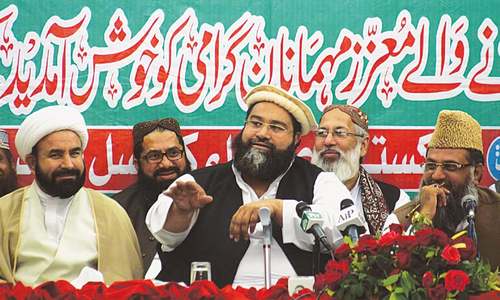LAHORE: Prime Minister Nawaz Sharif visited a prominent seminary on Saturday to enlist clerics’ help in combating the menace of terrorism, asking them to reject in forceful terms all the religious decrees that incite violence in clear misinterpretation of Islam — the religion of peace.
“Hate is being spread in the name of religion and it is the duty of the ulema to free it from hate and violence. One way of doing that is to reject all those fatwas that incite violence, [and] only the ulema can do it,” said the prime minister while addressing a seminar at Jamia Naeemia.
The seminary in Garhi Shahu is one of the first institutions in the country to have been targeted by terrorists with its principal among those who lost their lives in the incident. The terrorist attack occurred after Allama Dr Sarfraz Ahmed Naeemi, the principal, issued a fatwa against terrorists, the banned Tehreek-i-Taliban Pakistan, in particular.
Police told to improve their image among people
“We need to ask ourselves if seminaries are producing faithful and peaceful believers or flag-bearers of various sects, causing divisions in the nation and society in the name of religion,” Mr Sharif wondered.
He promised that the “few remaining militants” would not be spared. The government, he said, had brought the political leadership, the army, the police and other law enforcement agencies on the same page as far as dealing with terrorism and terrorists was concerned.
“Peace is not far off, especially if the ulema extend a helping hand,” he said, adding that religious scholars should play a proactive role in building an alternative narrative of Islam that promoted peace and harmony.
The religion has been held hostage by hate-mongers, he said.
Strengthening of democracy
While terrorism was mentioned by the premier as something posing a threat to the state, on a different note he emphasised the need for strengthening of democratic rule in the country.
During a visit to the Central Police Office earlier in the day, Mr Sharif urged the nation not to allow any attempts to derail the democratic system in order to ensure uninterrupted development and progress of national institutions.
Inaugurating a digitisation initiative by the police department, he lauded the IT-based reforms introduced by the Punjab police. “Our country has seen the discontinuation [of democracy] and many [military] people have tried to impose their will but failed. [Because of this] Roads were damaged and loadshedding continues to haunt the people. National institutions worsened while the infrastructure was damaged,” he said in an indirect reference to the Musharraf era.
At Jamia Naeemia, a seminary considered to have close ties with the Sharifs, the prime minister said that Islam is [a religion of] peace. However, of late, its name has been misused to “spread hate and violence”, while the holy concept of jihad had been hijacked by miscreants.
“Terrorists draw their strength from an extremist interpretation of religion which only the ulema can trounce by building an alternative, rather the true, narrative of peace and love,” he told his audience, which mainly comprised religious scholars.
At the police office, PM Sharif congratulated the Pakistan army, the Rangers, police and cricket authorities for successfully holding the PSL final match in Lahore despite threats of terrorism.
“We were told not to hold the match but we did. Steps [that are] in the best interest of the country should always be taken. The entire nation was on one side and a few were on the other,” he said, in a thinly-veiled reference to Imran Khan’s stance on holding the final.
The prime minister noted, however, that most people were not happy with the police and that there needed to be a way to check their performance. Most people in the country do not believe that the police would help the poor, he said.
Police authorities must change this image by promoting a culture of sympathy and decency in police stations, he said, urging the officials to promote the perception that police stations were centres of protection for the weak.
He conceded that the police, in most cases, managed to arrest criminals but the conviction rate continued to plummet because of faulty investigations that led to acquittal of the culprits.
“Train your investigation staff at the district and tehsil levels on modern lines and recruit law graduates as your investigators through the public service commission,” he said.
Published in Dawn, March 12th, 2017












































